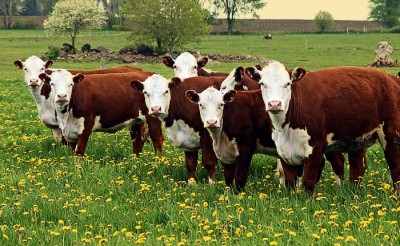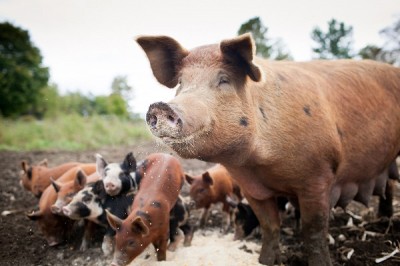
Michigan residents lost their “right to farm” this week thanks to a new ruling by the Michigan Commission of Agriculture and Rural Development. Gail Philburn of the Michigan Sierra Club told Michigan Live, the new changes “effectively remove Right to Farm Act protection for many urban and suburban backyard farmers raising small numbers of animals.” Backyard and urban farming were previously protected by Michigan’s Right to Farm Act. The Commission ruled that the Right to Farm Act protections no longer apply to many homeowners who keep small numbers of livestock.
Kim White, who raises chickens and rabbits, said, “They don’t want us little guys feeding ourselves. They want us to go all to the big farms. They want to do away with small farms and I believe that is what’s motivating it.” The ruling will allow local governments to arbitrarily ban goats, chickens and beehives on any property where there are 13 homes within one eighth mile or a residence within 250 feet of the property, according to Michigan Public Radio. The Right to Farm Act was created in 1981 to protect farmers from the complaints of people from the city who moved to the country and then attempted to make it more urban with anti-farming ordinances. The new changes affect residents of rural Michigan too. It is not simply an urban or suburban concern.
Shady Grove Farm in Gwinn, Michigan is the six and a half acre home to 150 egg-laying hens that provide eggs to a local co-op and a local restaurant. The small Michigan farm also homes sheep for wool and a few turkeys and meat chickens to provide fresh healthy, local poultry. “We produce food with integrity,” Randy Buchler told The Blaze about Shady Grove Farm. “Everything we do here is 100 percent natural — we like to say it’s beyond organic. We take a lot of pride and care in what we’re doing here.” Shady Grove Farm was doing its part to bring healthy, local, organic food to the tables of Gwinn residents, and it mirrors the attitudes of hundreds of other small farming operations in Michigan and thousands of others popping up around the nation. The ruling comes within days of a report by The World Health Organization that stated the world is currently in grave danger of entering a post-antibiotic era. The WHO’s director-general Dr. Margaret Chan argued that the antibiotic use in our industrialized food supply is the worst offender adding to the global crisis. “The Michigan Agriculture Commission passed up an opportunity to support one of the hottest trends in food in Michigan – public demand for access to more local, healthy, sustainable food,” Gail Philbin told MLive.
Meanwhile, neighboring Indiana Governor Mike Pence signed Senate Bill 179 a few weeks before which freed up poultry and egg sales from local and state regulation. Yesterday, the USDA Secretary Tom Vilsack announced massive funding to support research about small and medium-sized family farms, such as small farms ability to build-up local and regional economic systems. “There’s a lot of unnecessary legal action being taken against small farms who are doing good things in their communities,” said Randy Buchler, who is also on the board of directors for the Michigan Small Farm Council. The Michigan Small Farm Council actively fought to support Michigan farming freedom, but ultimately the Commission voted to approve the new restrictions.
“Farm Bureau has become another special interest beholden to big business and out of touch with small farmers, and constitutional and property rights of the little guy,” Pine Hallow Farms wrote to the Michigan Small Farm Council. The Michigan Farm Bureau endorsed the new regulatory changes. Matthew Kapp, government relations specialist with Michigan Farm Bureau, told MLive that the members weighed in and felt that people raising livestock need to conform to local zoning ordinances. The Farm Bureau did not feel Michigan’s Right To Farm Act was meant to protect the smaller farms, and ultimately the Michigan Commission of Agriculture and Rural Development agreed.


Link: Many Michigan residents will lose their right to keep livestock on their own property due to a new ruling from the state’s Commission of Agriculture and Rural Development.
 “We’re building up a mixed production farm, planning to farm during retirement, and we have a permit in hand for a livestock facility,” Deatrick said, “but have waited with building until we were sure of what the GAAMP changes would be. Now we’re having to reconsider our business plans and may sell the farm and buy a farm in a more rural area with definite [Right To Farm] protection, or move to another state that’s more welcoming and protective of small farm rights.”
“We’re building up a mixed production farm, planning to farm during retirement, and we have a permit in hand for a livestock facility,” Deatrick said, “but have waited with building until we were sure of what the GAAMP changes would be. Now we’re having to reconsider our business plans and may sell the farm and buy a farm in a more rural area with definite [Right To Farm] protection, or move to another state that’s more welcoming and protective of small farm rights.”
http://www.offthegridnews.com/2014/05/02/michigan-bans-animals-on-small-farms/
The Commission ruled April 28 that local governments have the right to ban livestock from any area zoned residential in the state.
The action will “effectively remove Right to Farm Act protection for many urban and suburban backyard farmers raising small numbers of animals,” Gail Philbin of the Michigan Sierra Club told Michigan Live. The Right to Farm Act is a state law designed to protect farmers from nuisance lawsuits and zoning regulations. The Commission ruled that the Right to Farm (RTF) Act does not apply to homeowners who keep small numbers of livestock.
“It’s all ‘Big Farm,” and it’s ‘Big Farm” deciding against the little farm,” Kim White, who raises chickens and rabbits, said of the Commission’s vote. “They don’t want us little guys feeding ourselves. They want us to go all to the big farms. They want to do away with small farms and I believe that is what’s motivating it.”
“The Commission is essentially taking sides in the marketplace,” Philbin said.
Bees, Chickens and Goats Now Illegal?
Governments could ban goats, chickens and even bee hives on properties where there are 13 homes within an eighth of a mile of a livestock property or another home within 250 feet of the property, under the Commission’s ruling, Michigan Public Radio reported.
“I believe we have over 100 communities in Michigan who have ordinances on the books against chickens and bees and other things, and they will be able to continue to move forward with those,” Jamie Clover Adams, the director of Michigan’s Department and Rural Development, told Michigan Radio.
The rationale for the Commission’s action is that officials are afraid there would be political pressure to repeal the Right to Farm to Act in order to stop backyard farming, Michigan Radio reported.
Opponents of the rule change have not laid out a course of action yet, although some backyard farmers are considering a legal challenge. Other possible courses of action include legislation in the state legislature and a ballot initiative.
Regulatory Limbo
Some homesteaders in Michigan could find themselves in a complete regulatory limbo because of the Commission’s action. Blogger, writer and organic farmer Michelle Regalado Deatrick does not know if she’ll be able to keep her livestock, because about half of her 80-acre farm may not be zoned for farm animals.
 “We’re building up a mixed production farm, planning to farm during retirement, and we have a permit in hand for a livestock facility,” Deatrick said, “but have waited with building until we were sure of what the GAAMP changes would be. Now we’re having to reconsider our business plans and may sell the farm and buy a farm in a more rural area with definite [Right To Farm] protection, or move to another state that’s more welcoming and protective of small farm rights.”
“We’re building up a mixed production farm, planning to farm during retirement, and we have a permit in hand for a livestock facility,” Deatrick said, “but have waited with building until we were sure of what the GAAMP changes would be. Now we’re having to reconsider our business plans and may sell the farm and buy a farm in a more rural area with definite [Right To Farm] protection, or move to another state that’s more welcoming and protective of small farm rights.”
GAAMP refers to the Generally Accepted Agricultural and Management Practices, a set of guidelines put out by the state of Michigan. The current GAAMP designates many small farms as Category 3 lands where livestock might not be allowed.
“Category 3 sites may be zoned for agriculture, but are generally not suitable for livestock production facilities,” the GAAMP states. “They may be suitable for livestock facilities with less than 50 animal units.”
Another problem is that local governments in Michigan are under no obligation to follow the GAAMP. It is simply a set of guidelines.
Michigan is one of several areas where property owners have had to fight for the right to raise food on their own land. Off the Grid News has reported that property owners in Florida and Quebec have been barred from planting vegetable gardens.http://www.offthegridnews.com/2014/05/02/michigan-bans-animals-on-small-farms/

No comments:
Post a Comment